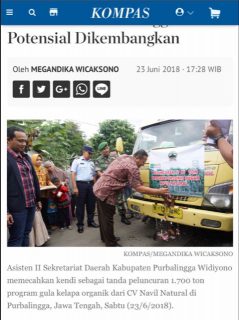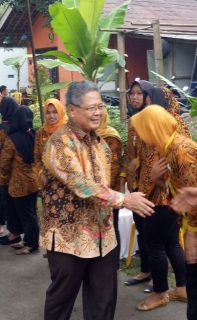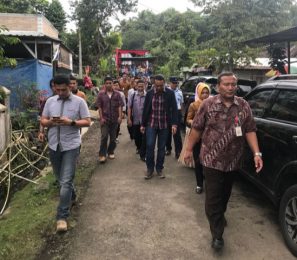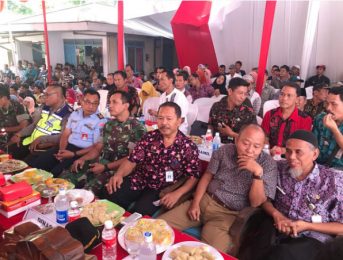A story from our organic coconut sugar program
From the very beginning we started organic coconut sugar program, we have been inspired and continue to work on building a sustainable supply chain that ties up all the stake holders (from farmers to importers) together and share the same awareness that all parties involved are in the same mutual relationship that supports continuous growth. Especially in organic coconut sugar program in Indonesia, the need to have a working sustainable supply chain is proven to be important. This is due to the supply nature of organic coconut sugar in Indonesia that is entirely relied on or produced by thousands of small farmers. As a result, there are multiple factors that need to be dedicatedly and consistently managed in order to create a strong foundation to support consistency and growth in quantity, quality and food safety. To achieve this, the first and among the biggest challenge is to have the farmers’ voluntary loyalty. This is a very big challenge because organic coconut sugar production areas in Indonesia is still mainly focused in few regions in Central Java. While at the same time, due to the business potential that the coconut sugar offers, the number of exporter companies that are interested to get into the industry keeps increasing. As a result, these companies’ supply areas are overlapping. Thus, farmers are drawn into a situation where they are approached by multiple coconut sugar exporters, which increases the difficulty to build a strong commitment from the farmers to any exporter company, which also affects their level of commitment to the quality and organic standards required on the product. At the same time, most of the exporter companies do not have a strong and reliable supply and manufacturing programs to support consistency in quality and in supply capacity. The struggle to get raw material pushes these companies mainly on how to get the material, and not so much on the integrity of the material (which are fundamental for the continuity of the supply program). Low commitment of the farmers towards the standards required and lack of strong and reliable supply and manufacturing programs from the exporter’s side, in the end, create inconsistent supply chain, which later create disappointment for both the farmers’ and customers’ (importers’). As this is what is happening in the field, I believe most of the importers that are sourcing organic coconut sugar from Indonesia are familiar with inconsistency in the quality and reliability of the material supplied.
It has been 3 years for us to build a consistent supply for organic coconut sugar (in Central Java) and the great news is that now we are at the level of obtaining strong loyalty from the farmers. This is because after all those years, we have proven to consistently provide continuous economic growth, which is reflected from the continuous growth of our purchase volume on the product produced by the farmers (90% of annual average growth since 2015). Navil has been recognized in contributing a big impact to the economic dynamics of the region.
Below are a few pictures of the event (held in June 2018) to recognize Navil Natural’s impact towards the farmers and economic dynamics in the region, which was attended by the farmers, the governor of Central Java, and other government officials:
The consistent growth on the economic side has been very helpful for us to get the farmers’ cooperation in the implementation of the basic GMP and the fundamental organic standards. Our proactivity in providing what the farmers need in order to fulfil the quality standard that we implement, is also a big help; We provide the food grade container for collecting the nectar to all of our farmers, provide the processing aid mixture (for slowing down the nectar fermentation process during tapping), we also provide a strong stainless steel sieve (resulting cleaner, safer, and finer material) for every farmer in our organic program. We are also focusing on providing the farmers a practical and simple to understand guidelines in fulfilling the organic standards and create an objective performance scoring system for the farmers’ actual performance in fulfilling the standards, which will be used later to generate incentive for them who fulfil the required score. All this also helps us to get the buy-in we need from the farmers in following the standards.
The consistent economic growth over the last years, plus the way we operate and manage the organic program with the farmers, have resulted in a strong foundation of voluntarily loyalty of the farmers to Navil Natural. Based on what is happening in organic coconut sugar supply situation in Indonesia, this is actually a very exciting achievement. However, the farmers loyalty based on the economic growth, which is measured mainly by the volume and consistency of purchase, is only the basic foundation of building a sustainable supply chain (from the farm side). Now that we have built the basic foundation, it’s time for us to give more focus and more structured programs on other aspect of the supply chain in order to create the actual “building” of a working sustainable supply chain. Based on the actual challenges we have been experiencing, the following are the current and next programs we are working on with the farmers to further build the sustainable supply chain:
- Inventing a climbing tool to ensure the safety of the farmers when they tap the coconut nectar.
Farmers climb the coconut trees twice a day in order to tap and collect the nectar. A farmer can climb 30-50 coconut trees with a height that can reach up to 30 meters per tree. The farmers are the ones who literally put their life on the line in the supply chain and there are accidents recorded of farmers falling from the trees and on some of the accidents caused the farmers’ life. We take this matter seriously and as we speak we are in the process of inventing the safety tool. The tool must provide not only the safety aspect, but the design and function must also generate acceptance from the farmers to use it.. since in the past a similar climbing tool as the one used in India was rejected by farmers as they concluded that the tool caused them the speed to climb. - Provide the farmers a periodic health check-up
The periodic health check-up will be a form of a preventive program to minimize the risk of farmers falling from trees. - Creating an insurance program for the farmers.
We are connecting this program to our program to develop a technology that uses waste to create alternative energy. The aim is for the farmers to finance their insurance program through the garbage that they produce, especially all the plastics used in the coconut sugar supply chain. In this case, we collect the garbage from the farmers to be converted/use it as energy, then it will be returned to the farmers in the form of insurance. - Creating an efficient and clean stove for the farmers to produce the nectar into granulated coconut sugar.
Currently the farmers are using wood as fuel in their conventional stove/oven. They have to buy the wood and this is the biggest expense in their operation.. not to mention the use of wood can also contribute foreign material from the wood burning residue to get into the wok. Creating and providing the stove to the farmers have a very positive impact to further increase the farmers economy without having to increase pricing, and increase the cleanliness of the product. The stove that we are working on is a gasifier type of stove.. this means significantly less pollution released into the environment, as most of the smoke is being used as fuel.
At least these 4 programs, we consider urgent and therefore need to closely develop in a well-structured and consistent manner, as we believe this will create another strong sustainable supply chain “building” on top of the foundation we currently have. To do this, we need to work more closely with our partners in the market in order to maintain the growth of our current purchase volume with the farmers.









